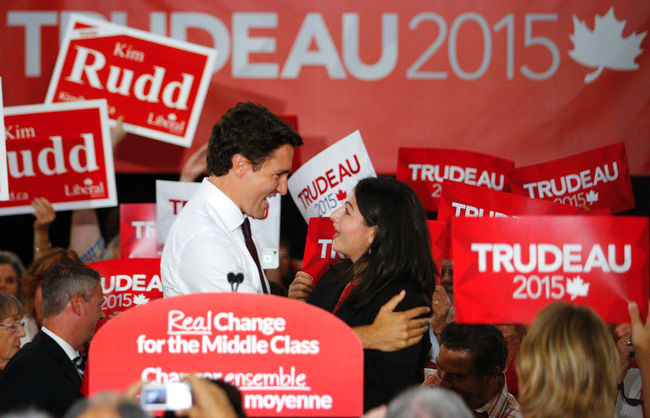
As summer closes and fall opens, Liberal MP Maryam Monsef has been making the rounds in the Peterborough-Kawartha region with a series of town hall meetings and community conversations regarding food policy. To mark this occasion, Arthur thought it would be apt to review Monsef’s progress since taking office.
Monsef was originally appointed as the Minister of Democratic Institutions following the Liberal Party’s house-majority win in 2015. The youngest member of Justin Trudeau’s gender-equal cabinet, she was often lauded by the press as a rising star.
She began her term with a reformation of the Senate’s appointment process. This was done via the introduction of an independent advisory board consisting of 3 federal and 2 provincial appointees, who are tasked with picking independent candidates unaffiliated with any political party to fill vacant Senate seats. A far cry away from the hopes of those who had been advocating for further senatorial democratization and even abolition during the campaign season, Monsef was nonetheless praised for her efforts to follow through on a major election promise so soon after her term had begun.
Despite a loyal fanbase among her constituents and many within the media during her early days in office, Monsef was by no means impervious to healthy doses of often-warranted skepticism. The handling of her mandate to oversee an inquiry into the restructuring of Canada’s election process drew criticism from both sides of the aisle following her formation of the Special Committee on Electoral Reform.
Critics cited the fact that the committee contained a majority of Liberal MPs, giving the Party the ability to move forward on electoral reform without the approval of any opposition members. However, most concerns were quelled when the committee was reformed to contain less Liberals than originally intended, as well as seats at the table for Green Party and Bloc Quebecois MPs.
Further controversy ensued following Monsef’s roll out of the MyDemocracy.ca survey, an online questionnaire that purported to give Canadians an opportunity to give their input as to what changes ought to be made to the electoral system. Detractors deemed the survey overly vague. They also cited the fact that it made no mention of any specific electoral system, most notably proportional representation – a much-discussed campaign promise – as a major point of contention.
Given the ambiguity of the language employed in the MyDemocracy survey, few were surprised when the Liberals ultimately ceased all inquires into electoral reform this past February. The announcement of this decision was made just weeks after a cabinet shuffle that found Monsef in a new position as Minister of Status of Women. This swap gave Monsef a chance to settle into her new role, while Democratic Institutions incumbent Karina Gould was left to deal with the subsequent aftermath of the government’s backtrack.
Rather than being tasked with leading the charge on reshaping the very fabric of Canadian democracy, Monsef’s renewed mandate is comprised mostly of arguably more supportive duties. These include working with other ministers on projects such as the implementation of gender-based analyses of the 2017 federal budget and departmental performance reporting, as well as the improvement of gender equity within Canadian corporations.
Perhaps Monsef’s most significant assignment as Minister of Status of Women thus far has been the implementation of a federal strategy to combat gender violence. She fulfilled this duty this June, when it was announced that the government would be investing approximately $109 million in funding to deal with these issues. Said funds are to be allocated among various federal agencies over a 5-year period in order to expand upon already-existing programs designed to prevent gender violence, provide support to survivors, and enhance the ability of the Canadian legal system to respond to such crises.
Monsef was also given the responsibility of working alongside the Minister of Justice and Ministers of Indigenous and Northern Affairs in tracking the progress of the National Inquiry into Missing and Murdered Indigenous Women and Girls. This role provides her with a unique opportunity to work with political actors advocating for legislation that directly impacts the Canadian indigenous population as a whole, as well as disenfranchised members of the Peterborough region’s indigenous community, namely those within Curve Lake First Nation.
In the local economic sphere, it has recently been announced that Peterborough-based biotech start-up Noblegen has been awarded a $600 thousand repayable contribution from the federal government. Another $200 thousand investment has also been announced for Peterborough’s Innovation Cluster to increase employment opportunities in the clean-tech sector. Earlier this year, it was also announced that the federal government would be providing just over $5.4 million in contributions toward the modernization of Peterborough’s public transit infrastructure. One could speculate this influx of federal funds towards the Peterborough community is, at least in part, the result of Monsef leveraging her proximity to fellow cabinet members as a means to promote the needs of the region.
It would not be unreasonable to assume Monsef’s clumsy tenure as Minister of Democratic Institutions was the result of blatant inexperience. A more cynical critic would likely affirm it was due to her being given the legislative “short end of the stick” in being tasked with advocating for policy that the Liberals never really intended on passing in the first place. Perhaps it was a bit of both. Regardless, Monsef’s new role as Minister of Status of Women has provided her with a chance to redeem herself- an opportunity she has not squandered. Despite being perceived by many as a demotion, she has utilized her new position to not only fulfill her objective in continuously fighting for issues of gender justice, but also to advocate effectively for her constituents. One can only hope this trend continues.
